October 2018
At Eurofinance 2018, the 27th conference on International Treasury Management, the cooperation between banks, corporate treasurers and fintechs to achieve common goals of speed and transparency was very much in evidence. Clarissa Dann reports on how buzz words made way for road maps and milestones
A year ago at EuroFinance Barcelona, we heard about preparing for the future and how treasurers were at the beginning of their future proofing journey. Twelve months on, some 2,100 delegates including 900 corporates descended on Geneva, the event having last graced this French region of Switzerland in 2008.
What became clear from panel sessions and one-to-one conversations was that #tomorrowstreasury means different things to treasurers whose revenue sources are consumers, and to those that are from other businesses – and whether they are service- or manufacturing-based companies.
The former not only know what PSD2 is, but are intensely curious about what open banking can do to help everything become faster, better and cheaper. The latter are rather more circumspect and will be slower to move (with a few exceptions) but – it would appear – loyal to their relationship banks to help navigate change. The other issue that reared its head in a number of panels and offline conversations was one of confidence in a bank’s ability to deliver efficient payment services – are they investing in robust platforms that work today or is there more prioritisation of innovation labs and hubs to “reinvent”?
In a nutshell, many treasurers don’t care about the nuts and bolts of the Payment Services Directive 2 (PSD2), or application programme interfaces (APIs) or blockchain – they just want their transactions to all to work – all the time and in real time – and provided this happens, the underlying mechanics and enabling regulation are not that interesting to them.
“Loyalty today,” quipped third-day speaker Howard Tullman of Ed Kaplan Family Institute for Innovation and Tech Entrepreneurship, is “not having the opportunity of doing something better”.
Mark Twain once said, “The reports of my death have been greatly exaggerated”, and the notion of fintechs eating the bank’s lunch seems to have lost most of its credibility, despite the odd bit of bank deprecation from the usual suspects. In fact, it was good to see how the Tier 1 banks are working with fintechs and appearing on panels with them.
Blockchain may have been the buzzword at previous EuroFinance events, but the B hype was far less in evidence as treasurers discussed solutions to basic problems of speed, transparency and transaction costs. The move from B to C was actually from Blockchain to Cooperation….with a bit of D for Data and E for Ecosystem thrown in.
On the ground
The first day’s plenary sessions, in very different ways, set the tone of taking change in one’s stride and living with uncertainty.
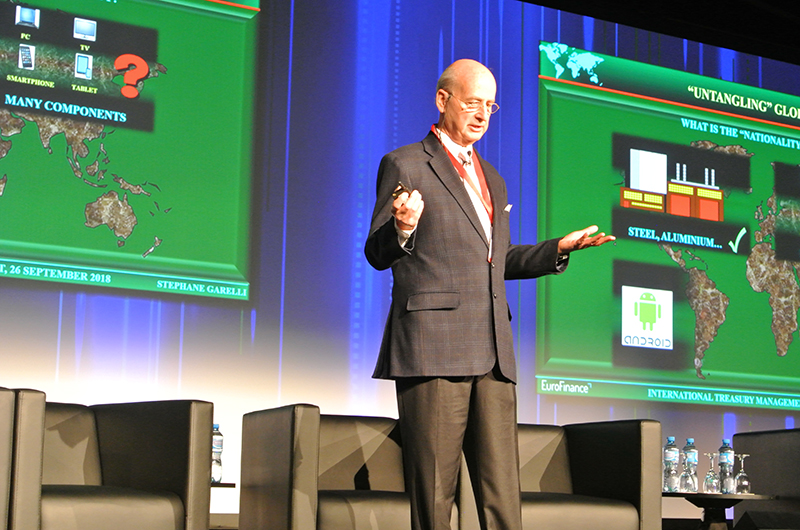
Reinvent or die, Time to look at the world differently
Stephane Garelli says you have to accept uncertainty
Stephane Garelli, World Authority on Competitiveness, Emeritus Professor at IMD Business School and University of Lausanne opened the plenary sessions with a wake-up call to the fact that while the good news is that there is a synchronised economic recovery (apart from South America and South Africa);” the bad news is nobody knows why”.
“Are we at the top of the cycle with oil at US$80/bbl?” he asked. “Technology is an enabler and not an objective and the fundamental objective of a company is to create a customer,” he noted from Peter Drucker, adding that you can’t eat a like on Facebook or drink a bitcoin. “You need to have imagination and innovation, which is fine but 95% of competitiveness is excellence in implementation. You can’t have innovation solving a problem of implementation,” he said. It’s not what happens to you that matters, but how you react to it. And you have to accept uncertainty, concluded Garelli.
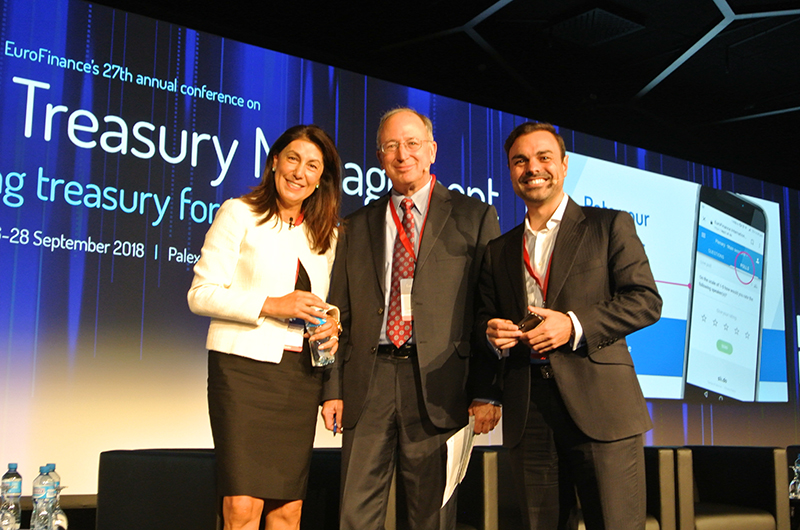
Change is here. How ready is your company and treasury?
Left to right Mandana Sadigh (Mattel); Robert Novaria (Treasury Alliance Group and session chair), Javier Orejas (IATA)
This was a panel session comprising flow cover treasurer Javier Orejas, Head of Banking EMEA at IATA; Mandana Sadigh, SVP and Treasurer of toy manufacturer Mattel (that sells Barbie); Saumya Mohan, Americas region Treasurer at Tesla. I was particularly interested to hear Sadigh’s perspective on managing change in the toy industry - and how the loss of investment grade status put treasury at the centre of strategic decision-making as Mattel is a working capital hungry company and works with seven strong banks to help with that. “We need to be back at investment grade to issue billions in commercial paper – right now we do a lot of asset-based lending,” she said. She works with customers and vendors to ensure tight control of DPO and DSO, and proactively manages FX exposure.
Scenarios that could change the world.
Sebastian di Paola of PwC and Wolfgang Ratheiser, VP Corporate Finance & Treasury, Porsche then embarked on a discussion of “Scenarios that could change the world” reviewing presentations on a cashless society, crypto-currencies, government debt mountains, supply chain relocalisation and how jobs and talent hunting will change. The Porsche experience of demand for cars from younger generations (particularly in China and Nigeria) has meant that it has had to adapt to a myriad of different payment methods. Tellingly, having invested in the systems to collect these payments, treasury is using the data to support sales develop services in response to what the payment data is telling them. “We need to position ourselves on e-payment sites,” he said.
Poised for take-off

Left to right: Gurjit Pannu (Uber); Jörg B Berműller (Merck); Robert Novaria (Treasury Alliance Group and session chair); John Ferguson (EIU); Michael Spiegel (Deutsche Bank)
The future is now: How ready is treasury?
In line with the overall theme for the conference the new annual Economist Intelligence Unit treasury survey supported by Deutsche Bank reported on how ready treasurers are for new technologies and disruptive change, and this was the panel that discussed some of the points in more detail. Delegates were encouraged to download and read the whole report on the Deutsche Bank website here. We heard confirmation that having technology was not enough – it was all about how you use it.
John Ferguson of the Economist Intelligence Unit expressed his surprise that only 55% of the 300 treasurers surveyed said that technology was disrupting the operational part of their business and therefore impacting their role “There is a growing divergence between those treasurers that have the resources to roll out this technology and advance it and those that do not, and this says something about the strategic role of the treasurer,” he added.
The findings, said Michael Spiegel, Deutsche Bank’s Global Head of Cash Management were “a fair reflection of what we see in client responses around the world”. “We look for interesting themes that provide content,” he continued, adding that “the power we will see in open banking and APIs is bigger than that survey showed”. Treasurers cannot experiment with the latest technology – it is too crucial to the business – so he thought there might be a lag in uptake.
Jörg B Műller, Head of Cash and Risk Management at Merck, Germany, said that his treasury colleagues were currently very prepared and “able to manage the future”. However, it is lack of prioritiisation up the line that was holding them back. New technology such as machine learning and AI are simply tools to improve efficiency. The team is a mix of IT specialists and former bankers – “we think in processes – if a subsidiary needs a loan it gets typed in once”. Uber’s Gurjit Pannu, (EMEA Treasury Manager) said they were in the fortunate position of not having legacy systems. “If you wait for the perfect solution and take seven months to implement it, it might be obsolete”. He sees Uber as prepared, being a young company, "but there might be new things coming up we are not prepared for".
“It’s a constant evolution and you can only create planning scenarios – as you cannot predict the future – and keep adjusting from there,” said Spiegel. Treasury silos of B2B and B2C are converging and banks need to be relevant to both. The innovation is that we collaboratively need to work in the ecosystem and find solutions that go through to the end market. “You cannot reverse globalisation” he concluded, “as an industry we are embracing the fintech challenge and a new ecosystem will emerge as a result”.
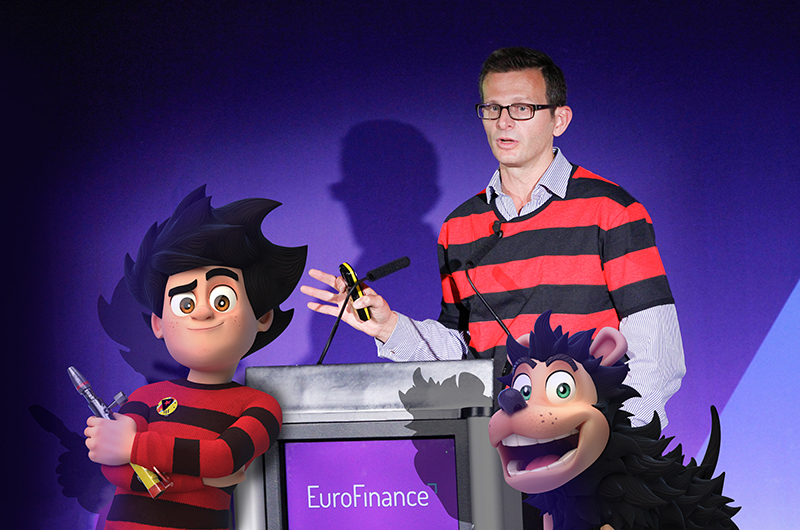
Transforming the Digital Future
From left to right: Denis the Menace, David Guppy and Gnasher from Beano Studios
Source: EuroFinance and Beano Studios
A heartwarming presentation in Stream 5 was a lovely way to end the day, with CFO David Guppy, clad in his Dennis the Menace striped shirt (see above), explaining how Beano Studios is turning an 80-year-old UK comic legend into a children’s digital multi-media entertainment success story inside just 18 months – headcount at the Beano is now a mere 50, and the finance team comprising three people.
For the website www.Beano.com they create a mix of child-safe, appropriate shorter form digital content that reflects children’s lives to accompany the longer form TV content. Children are not watching as much terrestrial TV as they migrate more and more to content on digital devices.
“You have to be aware of the changing landscape and ensure you are aware of the business and consumer needs”. The brand is well known and loved in the UK but they are looking to scale up into the US market and other International markets. Guppy updates the five year plan every six months and does rolling forecasts every month. He admits to using Excel for now, but is looking for better tools. “Finance are at the heart of strategic thinking at Beano Studios and part of the international growth story.” He said it is difficult to work out if a piece of content drives value. They look at the audience and how long they stay. Data and insights is at the heart of everything we do at Beano Studios. The parent company is DC Thompson in Dundee (supporting the refresh and reboot and growth of the brand financially) “We are on a journey with them [the parent] to be more responsive to our needs,” said Guppy. When he asks for new forms of financing and bank accounts for a new production the treasury team are now having to turn it around faster than they are used to. This is a culture change we are working on together, concluded Guppy.
In Open Banking Discovery Lab (Stream 9), there was standing room only – proving that it was the buzzword of this year’s conference – from Deutsche Bank’s Head of Digital Cash, David Watson’s opening conversation with Chris Van Woert, Head of Treasury at Stripe, the internet commerce platform to the end of day panel discussion between Deutsche Bank’s Head of Cross Product Solutions, Benjamin Madjar and IATA’s Javier Orejas – with the animated demo of the Deutsche Bank/IATA push payment solution proving the point that the talk of innovation from last year is now becoming real.
Open banking, Open Sesame
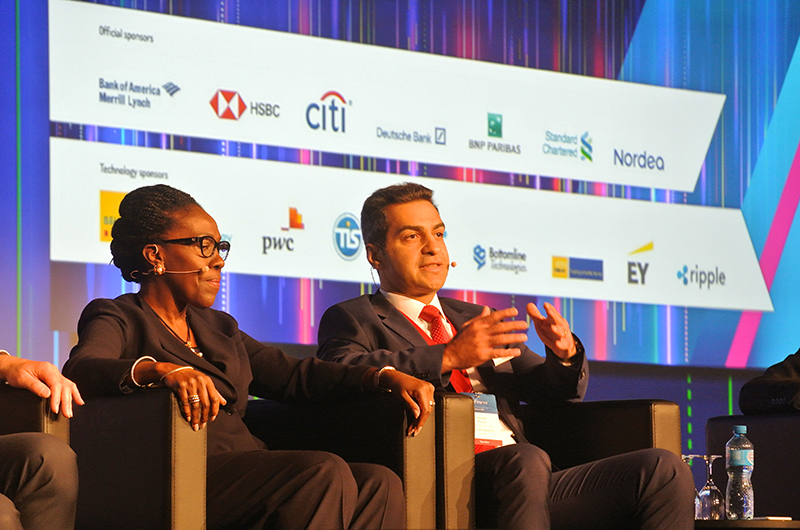
A new world of banks means more opportunities for treasury?
Left to right: Ireti Samuel-Ogbu (Citi); Shahrokh Moinian (Deutsche Bank) see Open Banking and APIs forming a ‘virtuous circle”
It was during this panel that the treasury focus is on better outcomes today rather than the technology and connectivity delivering it and what might happen tomorrow. Deutsche Bank’s Global Head of Cash Products Shahrokh Moinian, together with Ireti Samuel-Ogbu, EMEA Head of Payments & Receivables at Citi represented the banking stance and Albert Hollema, of the Endemol Shine Group and Paul Misere of Medtronic (both from the Netherlands) provided the corporate perspective.
“I think open banking is an interesting concept and a good development”, said Hollema. He thought banks were afraid that fintechs would take over and step in aggressively, however “Today I don’t see that and only a very small number of the fintech start-ups will still be there in five years. The collaboration between fintechs and banks is encouraging,” he added.
There has, said Samuel-Ogbu, been a shift from batch to real-time with regulation (PSD2) as an enabler. “The opportunity to access other bank accounts in real time using APIs and banks providing API capability to their clients is potentially a virtuous circle and an opportunity,” she said.
Moinian agreed and added, “Open banking is one of the biggest disruptions we are seeing in the industry, the full effect of which has not been fully realised. And regulation has made it a foregone conclusion. Some banks just focus on compliance, but others take the opportunity to provide corporate clients more services and go to the next level.”
Paul Misere countered saying, “It’s not a hot topic for a lot of treasurers”. Which seemed to be backed up by the instant poll of the room, where 55% of the audience did not seem excited by PSD2. Medtronic is one of the largest suppliers of medical equipment and very much B2B. However, he did say, that the whole thing was “an eye opener to start having a dialogue with my main banking partners to see what opportunities Open Banking brings, and how we as an organization can map that into our everyday business.”
Wallet to wallet, end-to-end
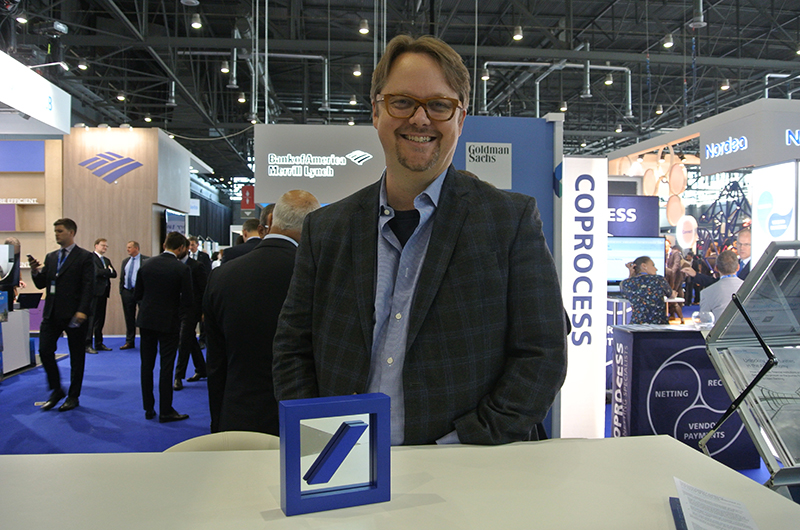
Bruce Parker, Founder and CEO of ModoPayments
Bruce Parker, Founder and CEO of Modo within the Deutsche Bank fold at EuroFinance Geneva 2018
When Deutsche Bank announced its stake in ModoPayments (Modo), the Dallas-based payments technology company facilitating payments into wallets, John Gibbons commented on how “more and more payments globally are executed via fintech and online platforms”. Modo CEO and founder Bruce Parker was among the speakers at Eurofinance, (Day 1 in the Open Banking Lab, and on Day 2, Ask the Experts, Stream 6 with SWIFT and Bank of America). I managed to catch up with him over a cup of UniCredit coffee (the shortest queue and… Italian).
On treasurers’ lack of excitement over open banking and APIs, Parker said, this is a “failure of imagination” and what they do understand is the problem they want solved. “They are interested in a connection between their ERP package and stakeholders around their ecosystem, their bank’s clients and suppliers and their banks. That ecosystem is screaming for interoperability.” He believes that what has happened right now is that they don’t see the connection between open banking and that being a solution – and this will come with education.
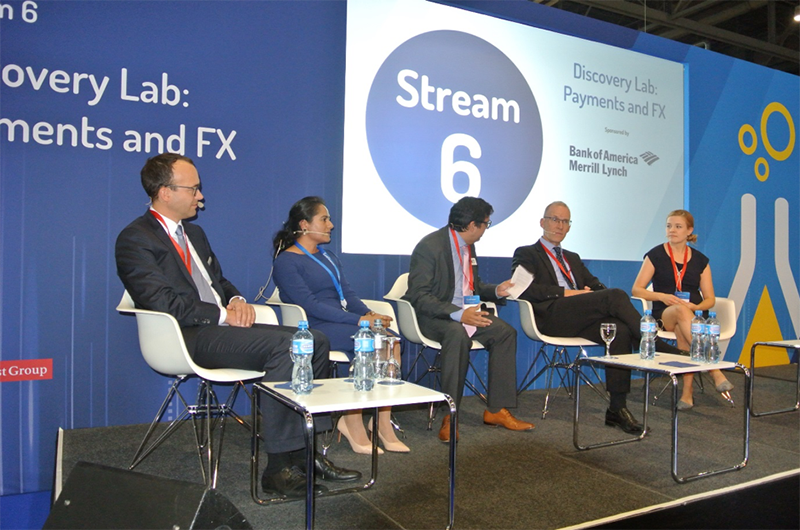
Get real: innovations in cross-border payments for today
Left to right: Christof Hofmann, Global Head of Payments and Collection Products, Deutsche Bank; Preeti Chaturvedi, Global Receivables and Payments Product Manager, Citi; Sebastian Rojas, Global Senior Market Manager, SWIFT gpi; Martin Schlageter, Head of Treasury Operations; and Paivi Paananen, Senior Banking Technology Specialist, Booking.com
Live since 2017 SWIFT gpi, a cloud-based tracker solution, represents one of the most significant innovations to cross-border payments with more than US$100bn worth of payments sent daily. This panel took a closer look at how this new standard in international payments can generate added value for multi-banked corporations and reviewed the progress and significance of pilot scheme testing an enhanced multi-bank standard to further improve the payments experience for multi-banked corporates.
This pilot currently has ten corporates and 12 banks and more recruits are welcome, according to SWIFT’s Rojas. He made the point that a few years ago, everyone was talking about blockchain at EuroFinance, but now it was all about collaboration – with SWIFT gpi being a perfect example.: “Cross-border payments went into a black box, you hoped it would come out OK the other end, and when it didn’t, you had to spend a long time with your banking investigating” and “Zero transparency, incredibly slow, and no warning of high fees along the payment journey”, were just some of the reflections from the corporate panellists.
So it is hardly surprising that there is such enthusiasm for a solution that delivers corporates increased transaction speed (50% of gpi payments going in 30 minutes), and the transparency gained by having sight of all their payment flows, however many banks they are with, via their ERP and treasury management systems. In Q4 2018 Deutsche Bank will extend the gpi developments pilot for corporate clients through ‘gpi for Corporates’ (g4C), allowing them to generate and include the UETR in their own payment instructions. Non-pilot customers will receive these in 2019. “This is a game-changer,” said Christof Hofmann.
APIs and data: the need for standards
Rounding off day two, Christian Schaefer, Deutsche Bank’s Head of Payments, participated in a panel also featuring Vincent Jansen from Innopay, where they talked to the recent white paper titled “Unlocking the opportunities in the API economy”. Open banking was definitely the buzzword for EuroFinance this year, with plenty of calls from both banks and corporates on the need for industry standards. Given the opportunities to not only improve basic processes such as reconciliation, but to use the resulting dataflows from API-enabled connectivity, the risks need to be addressed. As Schaefer puts it, “Once a common API standard has been defined its large-scale adoption is essential to create scale. Therefore we believe it is important that all industry players become actively involved in the working groups on harmonisation and implementation of standards.”
Change and transformation

Heads together – How we see the finance profession developing
Left to right: Simon Taylor (Co-founder and director, 11FS), Timothy Smallow (Treasury, Amazon); Carole Berndt (Senior Adviser, Transitionhub); and Philip Green (former CFO of Deliveroo)
Digital banking evangelist Simon Taylor chaired the final panel of the conference with discussion centring on banking support as treasuries change and scale up – with the ability to balance the day job with what might be needed tomorrow. There general agreement that they needed confidence in their banks’ ability to invest in their own technology to keep up with treasury demands.
Smallow clearly had a focus on data: “We are a company of customer obsession and we focus on what we can do to please our customers, as well as what we can do to scale up our business. We focus on large datasets, complex problems and quick growth, and we need to be able to pull all this information together to make good decisions.”
Green reminded delegates that all change has to be grounded in basic business need. “You start with the business forecast and hand it onto the treasury team to do a cash forecast. The question ‘How much cash do we have and how much cash do we need’ sounds very simple, but it is very hard to get a straightforward answer.” And when it came to looking at new technologies to improve processes, Green commented, “First, check if you actually need the process. Is it adding value?”
Pack your bags as we may not see you again – how to survive the future
No EuroFinance conference would be complete without a futurist closing plenary session and Howard Tullman of the Ed Kaplan Family Institute for Innovation walked delegates through why “the competition between steel and smarts is just the beginning of what we are seeing in every industry”. Car sales will fall as people realise that 14% of all real estate is parking, full of cars going nowhere, and Uber will be a replacement transport option. “Uber is three times more efficient at getting to us than an ambulance,” he noted. The relentless drive to find solutions that save time will, he said, “impact payments and everything we do with our financial institutions”.
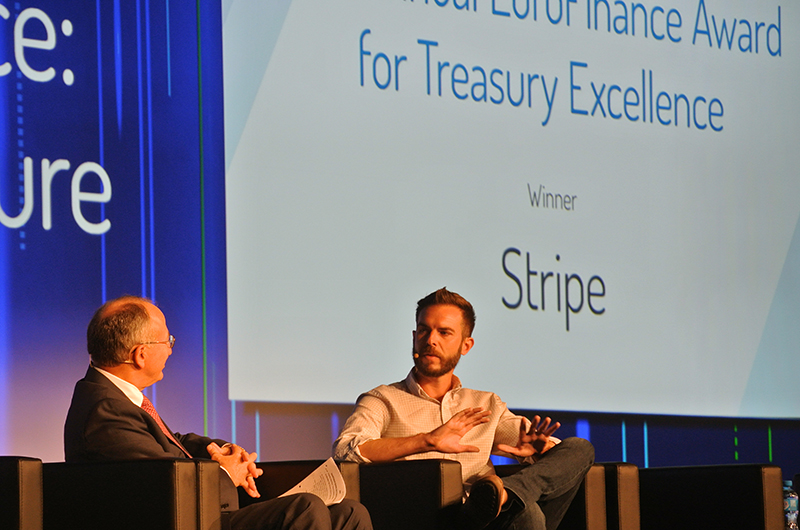
The Annual EuroFinance Award for Treasury Excellence: Treasury prepared for the future
First hire your engineers…Robert Novaria talks to Christopher Van Woeart (Head of Treasury, Stripe) about how he set up a treasury for cash and payments solution provider from scratch
Session chair Robert Novaria’s fireside chat with Stripe’s Christopher Van Woeart was the EuroFinance Geneva swansong (both are regular speakers at the Deutsche Bank supported Economist Global Treasury Leaders’ Summits) and proved to be rather an eye opener.
Van Woeart joined Stripe, the internet commerce platform in 2016, having earlier had a long career at Goldman Sachs, as Vice President of Corporate Treasury. He talked about how he jumped at the opportunity to build a treasury from scratch in the fintech space – on a product that helped businesses solve cash management and payment needs. This was a powerful closer because here was a seasoned former corporate treasury banker explaining what expertise was used to build a treasury system from scratch.
Before he started at Stripe, his boss had allocated treasury a couple of the company’s best engineers, who had “a different approach to addressing problems”. He was pleasantly surprised at the way the team talked through solutions to treasury challenges: “You need to do XYZ because of ABC and we could code that up immediately and have the computer deal with it.”
And for this reason the balance of headcount is weighted more towards engineers (there are 15 of them working on current projects) and data scientists than finance professionals (although the finance professionals they do have are “heavy hitting and from large FIs”, given the flows that Stripe has). Basics of treasury, he said can be taught, for example the principle of not moving market out of a market or a currency, so this is baked into coding that achieves this outcome automatically.
Another change is the reduction in routine tasks that used to be done by analysts – the engineers and data scientists now automate what used to be downloaded, packaged into Excel pivot tables and pushed out to management. “We build a dashboard from the underlying data and autogenerate every day,” he said.
Which seems an appropriate thought to hold after an inspiring three days.
Note: This briefing covers the some of the main highlights, but we would encourage you to put #EuroFinance or #tomorrowstreasury into Twitter to see the tweets (including those from Deutsche Bank) that reflect what comments stood out
Next year, EuroFinance will be held in Copenhagen, 16-18 October 2019
Go to Corporate Bank EXPLORE MORE
Find out more about products and services
Go to Corporate Bank Go to Corporate BankStay up-to-date with
Sign-up flow newsbites
Choose your preferred banking topics and we will send you updated emails based on your selection
Sign-up Sign-upSubscribe Subscribe to our magazine
flow magazine is published annually and can be read online and delivered to your door in print
You might be interested in
CASH MANAGEMENT
Digital treasury accelerates in Asia Digital treasury accelerates in Asia
Treasury digitisation across Asia was gaining traction even before Covid-19 struck, but the pandemic has accelerated the process. A recent Deutsche Bank webinar provided a progress report
Cash management, flow case studies, Technology {icon-book}
Tomorrow’s treasury: what’s the role of real-time? Tomorrow’s treasury: what’s the role of real-time?
The vision of a “real-time treasury” has been around for several years now. But how do instant payments and access to real-time information really change the way treasury is managed? flow’s Desirée Buchholz hosts a debate on the role of real-time in the future of treasury
flow case studies, Cash management {icon-book}
Treasury forward Treasury forward
Boehringer Ingelheim has grown into Germany’s biggest pharma company. flow’s Desirée Buchholz reports on how its treasury function supports business expansion by taking a deep-dive into an innovative workflow automation project in Asia-Pacific



